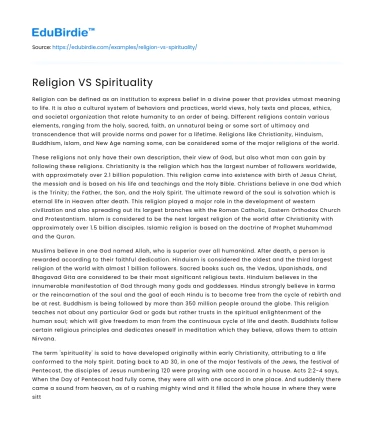Religion can be defined as an institution to express belief in a divine power that provides utmost meaning to life. It is also a cultural system of behaviors and practices, world views, holy texts and places, ethics, and societal organization that relate humanity to an order of being. Different religions contain various elements, ranging from the holy, sacred, faith, an unnatural being or some sort of ultimacy and transcendence that will provide norms and power for a lifetime. Religions like Christianity, Hinduism, Buddhism, Islam, and New Age naming some, can be considered some of the major religions of the world.
These religions not only have their own description, their view of God, but also what man can gain by following these religions. Christianity is the religion which has the largest number of followers worldwide, with approximately over 2.1 billion population. This religion came into existence with birth of Jesus Christ, the messiah and is based on his life and teachings and the Holy Bible. Christians believe in one God which is the Trinity; the Father, the Son, and the Holy Spirit. The ultimate reward of the soul is salvation which is eternal life in Heaven after death. This religion played a major role in the development of western civilization and also spreading out its largest branches with the Roman Catholic, Eastern Orthodox Church and Protestantism. Islam is considered to be the next largest religion of the world after Christianity with approximately over 1.5 billion disciples. Islamic religion is based on the doctrine of Prophet Muhammad and the Quran.
Save your time!
We can take care of your essay
- Proper editing and formatting
- Free revision, title page, and bibliography
- Flexible prices and money-back guarantee
Muslims believe in one God named Allah, who is superior over all humankind. After death, a person is rewarded according to their faithful dedication. Hinduism is considered the oldest and the third largest religion of the world with almost 1 billion followers. Sacred books such as, the Vedas, Upanishads, and Bhagavad Gita are considered to be their most significant religious texts. Hinduism believes in the innumerable manifestation of God through many gods and goddesses. Hindus strongly believe in karma or the reincarnation of the soul and the goal of each Hindu is to become free from the cycle of rebirth and be at rest. Buddhism is being followed by more than 350 million people around the globe. This religion teaches not about any particular God or gods but rather trusts in the spiritual enlightenment of the human soul; which will give freedom to man from the continuous cycle of life and death. Buddhists follow certain religious principles and dedicates oneself in meditation which they believe, allows them to attain Nirvana.
The term 'spirituality' is said to have developed originally within early Christianity, attributing to a life conformed to the Holy Spirit. Dating back to AD 30, in one of the major festivals of the Jews, the festival of Pentecost, the disciples of Jesus numbering 120 were praying with one accord in a house. Acts 2:2-4 says, When the Day of Pentecost had fully come, they were all with one accord in one place. And suddenly there came a sound from heaven, as of a rushing mighty wind and it filled the whole house in where they were sitting. Then there appeared to them divided tongues, as of fire, and one sat upon each of them. And they were filled with the Holy Spirit and began to speak with other tongues, as the Spirit gave them utterance. “Multitude of people who had gathered in Jerusalem was stunned by the supernatural wind and fire descending on the house where the apostles were praying. Here they saw the power of the Holy Spirit manifested upon 120 men speaking in different languages but all were speaking about Jesus Christ and every man was able to hear the Gospel in his own language” (Thanasingh 4).
With the change in times, the meaning expanded to include mental aspects of life, while the term both spread to refer to a broader scope of experience, including that of mystic practice. Generally, spirituality can be referred to as having a connection to the religious and moral values, or matters concerning the inner soul, rather than the material gains. It can also be considered a process of transforming man to its original form i.e., in the image of God. In modern times the attention is on innate experience of a sacred level, and the utmost values and meanings by which people live, separated from organized religious institutions. Spirituality in modern times typically includes a belief in an unnatural or supernatural domain, personal development, a pursuit for an ultimate/sacred meaning, or a confrontation with the inner self. The meaning of spirituality has developed over time with various connotations and significance.






 Stuck on your essay?
Stuck on your essay?

